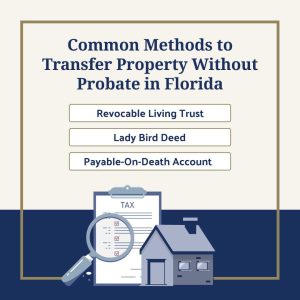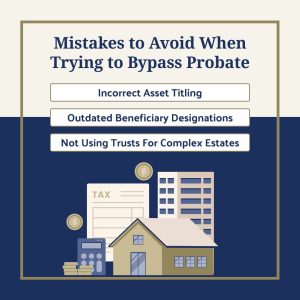Probate can be a time-consuming and costly process that many families would prefer to avoid, especially when it comes to transferring property after a loved one’s passing. In Florida, there are several legal strategies that allow you to pass on real estate, bank accounts, and other assets without going through the probate court system. These methods not only save time and money, but also preserve privacy and reduce the risk of disputes.
In this guide, we’ll explore the most effective ways to transfer property outside of probate, common mistakes to avoid, and when probate may still be necessary. Whether you’re planning ahead for your own estate or managing a loved one’s affairs, understanding your options can help you protect what matters most.
What Is Probate?
Probate is the legal process through which a deceased person’s assets are distributed and their debts are settled under court supervision. This process involves validating the will (if one exists), appointing a personal representative, identifying and appraising assets, paying outstanding debts or taxes, and distributing property to heirs or beneficiaries. In Florida, probate can be time-consuming and expensive, often lasting several months or more, especially if the estate is significant or contested.
Why Avoid Probate in Florida?
While probate serves an important legal function, many people aim to avoid it due to the delays, costs, and lack of privacy involved. In Florida, probate can take several months or longer, tying up assets and delaying distributions. Court fees, attorney costs, and administrative expenses can also reduce the value of the estate. Additionally, probate records are public, meaning your estate details become part of the public record—something many families prefer to keep private. Avoiding probate allows for faster, more efficient property transfers and greater control over your estate.
Common Methods to Transfer Property Without Probate in Florida
Florida residents have several legal tools available to transfer property outside of probate. These methods allow assets to pass directly to beneficiaries upon death, avoiding court involvement. Options include living trusts, Lady Bird deeds, joint ownership arrangements, and beneficiary designations. Each strategy has its benefits and limitations, so choosing the right approach depends on your goals and the type of property involved.
Revocable Living Trust
A revocable living trust allows you to transfer ownership of your assets into a trust during your lifetime, naming a trustee to manage them after your death. Since the assets are held in the trust, not in your personal name, they bypass probate entirely. This option offers flexibility, privacy, and control, making it one of the most effective probate-avoidance strategies in Florida.
Lady Bird Deed (Enhanced Life Estate Deed)
The Lady Bird deed is a Florida-specific tool that allows real estate to transfer automatically to a named beneficiary upon your death, without giving up control during your lifetime. You retain full ownership rights, including the ability to sell or mortgage the property. When properly executed, it avoids probate while preserving eligibility for Medicaid and maintaining your homestead protections.
Joint Tenancy With Right of Survivorship
Joint tenancy with right of survivorship allows property to transfer directly to the surviving co-owner when one owner passes away. Common among spouses, this arrangement bypasses probate entirely. It’s important that the ownership is clearly titled this way, and that all joint owners understand the legal implications, especially if there are other heirs or complex estate plans involved.
Payable-on-Death (POD) or Transfer-on-Death (TOD) Accounts
Payable-on-Death (POD) and Transfer-on-Death (TOD) designations let you name beneficiaries for bank accounts, retirement funds, and investment accounts. Upon your death, these assets will be transferred directly to the named individuals without probate. These designations are easy to establish, free of charge, and highly effective. However, it’s essential to review them regularly to ensure they align with your current estate plan.
Special Considerations for Real Estate Transfers in Florida
Transferring real estate outside of probate in Florida involves more than just choosing the right tool. Unique state laws, such as homestead protections, creditor rights, and Medicaid recovery, can impact how and when property is passed on. It’s important to consider these factors carefully to avoid legal complications and to ensure your estate plan remains compliant and tax-efficient.
Florida Homestead Laws
Florida’s homestead laws provide strong protections for a primary residence but also impose restrictions on how it can be transferred. These rules can limit your ability to disinherit certain family members or use certain probate-avoidance tools. Violating these laws can result in invalid transfers or force probate involvement, making it critical to understand how homestead status affects estate planning.
Creditor Protections
In Florida, certain real estate transfers may expose your assets to creditor claims if not structured properly. Homestead property, for example, is generally shielded from most creditors, but non-homestead property may not be. The method used to transfer ownership, such as a trust or deed, can influence creditor access. Proper planning ensures that your assets remain protected after your death.
Medicaid Recovery Issues
If you received long-term care benefits through Florida Medicaid, the state may attempt to recover costs from your estate after death. Certain property transfers can trigger Medicaid estate recovery unless they’re handled correctly. Tools like Lady Bird deeds may preserve Medicaid eligibility while avoiding probate. Coordinating with an estate planning attorney helps protect both your assets and your benefits.
Step-Up in Basis and Tax Planning
When property is inherited, heirs often benefit from a “step-up” in basis, which reduces capital gains taxes if the property is later sold. Avoiding probate doesn’t mean forfeiting this benefit, but it requires careful planning. Improper transfers during your lifetime could result in higher tax burdens for your beneficiaries. Estate plans should always factor in long-term tax implications.
Mistakes to Avoid When Trying to Bypass Probate
While avoiding probate can save time and money, simple mistakes can derail even the best-laid plans. Errors in documentation, titling, or beneficiary designations may lead to disputes or force assets back into probate. Careful planning, regular updates, and professional guidance are essential to ensure your estate transfers smoothly and your wishes are legally protected.
 Failing to Title Assets Correctly
Failing to Title Assets Correctly
Even if you set up a trust or choose joint ownership, assets must be titled appropriately to match your estate plan. If a property or account remains in your individual name, it may still go through probate. Double-check that deeds, account registrations, and legal documents reflect the intended ownership structure to ensure they transfer as planned.
Outdated Beneficiary Designations
Failing to update beneficiary designations after major life events, such as divorce, death, or estrangement, can lead to unintended inheritances. Outdated forms may override your will or trust, causing conflict or litigation. Regularly reviewing and updating these designations on life insurance policies, retirement accounts, and bank accounts is critical to keeping your estate plan accurate and effective.
Not Using a Trust for Complex Estates
For individuals with significant assets, blended families, or unique distribution wishes, skipping a trust can cause confusion and disputes. Trusts provide flexibility, privacy, and detailed control over how assets are managed and distributed. Relying solely on basic tools like deeds or beneficiary forms may not offer the protection or customization needed for more complicated estate plans.
Relying on Verbal Promises or Informal Agreements
Verbal agreements or handwritten notes are not legally binding in Florida estate planning. Informal arrangements often lead to disputes, especially if multiple heirs are involved. Courts rely on properly executed legal documents, not intentions shared in passing. Always formalize your wishes through official documents drafted or reviewed by an experienced estate planning attorney.
Overlooking Digital Assets or Out-of-State Property
Digital accounts, cryptocurrencies, and out-of-state real estate are often forgotten in estate plans. Without clear instructions, these assets may be lost or forced through probate in multiple jurisdictions. Properly including them in your estate plan through trusts, digital asset authorizations, or additional legal tools ensures they’re transferred efficiently and protected for your beneficiaries.
Using Estate Planning to Coordinate Non-Probate Transfers
Even when avoiding probate, estate planning is vital in ensuring your assets transfer smoothly. A well-structured plan coordinates tools like trusts, beneficiary designations, and joint ownership to minimize confusion or conflict. Aligning all documents under a unified strategy helps protect your legacy, reduces delays, and ensures each asset is handled according to your specific wishes.
Naming a Successor Trustee or Agent
Appointing a reliable successor trustee or power of attorney ensures your affairs are managed if you become incapacitated or pass away. These individuals fulfill your wishes and handle non-probate transfers such as distributing trust assets or managing financial accounts. Choosing someone trustworthy and clearly outlining their authority helps prevent delays and disputes during a sensitive time.
Coordinating with Financial Institutions
Many non-probate transfers rely on proper coordination with banks, brokerages, and insurance companies. These institutions require updated beneficiary forms, account titles, and legal documents. Failing to align your estate plan with their internal procedures can delay or block asset transfers. Reviewing your plan with each institution ensures your designations are honored quickly and without legal complications.
Updating the Plan Over Time
Life changes, like marriage, divorce, births, or deaths, can impact how your assets should be distributed. Regularly updating your estate plan keeps it aligned with your current wishes and prevents outdated information from causing confusion. Without updates, even well-crafted non-probate tools can lead to disputes or unintended outcomes. Aim to review your plan every few years or after major events.
When Is Probate Still Necessary?
Despite careful planning, probate may still be necessary in some situations. If a person dies without a will or leaves behind assets titled solely in their name, those items typically must go through probate. Disputes among heirs, unclear beneficiary designations, or overlooked property can also trigger court involvement.
Additionally, some creditor claims and legal obligations may require probate resolution. Even with probate-avoidance tools in place, working with an estate planning attorney ensures all assets are properly accounted for and distributed according to your wishes.
Schedule a Consultation With an Estate Planning Attorney
Avoiding probate involves more than simply filling out forms; it requires careful planning and legal precision. Our experienced Orlando estate planning attorneys can help you choose the best strategies to protect your property and transfer assets efficiently. Whether you’re setting up a trust or updating beneficiary designations, contact us today to learn more about the estate planning services offered by our attorneys.



 Failing to Title Assets Correctly
Failing to Title Assets Correctly